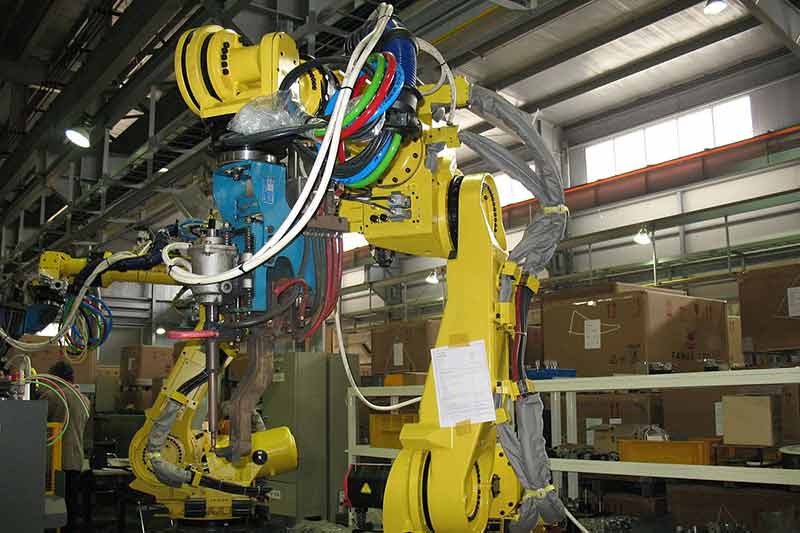
Speaking at a recent seminar on “Driving Thai Economic Development
through the Automation and Robotics Industry,” Chokdee Kaewsaeng, Deputy
Secretary General of the Board of Investments (BOI) in Thailand, talked about
demand and supply side initiatives from the Thai Government for existing as well
as new projects, to accelerate the growth and development of the robotics and
automation industries and technologies.
In September, it was announced that the Office of Industrial
Economics (OIE) in Thailand is pushing
forward measures to develop the robotics and automation industries in
Thailand after receiving cabinet approval. The government is aiming for an
investment of 200 billion Baht (US$6 billion) over the next five years. The
development plan also aims to reduce the import of robotics and automation
systems by 132 billion baht (US$3.97 billion) on an annual basis.
Automation and Robotics is among the 10 targeted
industries under Thailand 4.0. These industries can be divided into
two segments: 1) First S-curve or five existing industrial sectors (which can
be developed by adding value through advanced technologies and the New S-curve
or five sectors which can serve as growth engines to accelerate Thailand’s
future growth. Automation and robotics is among the new S-curve industries.
According to the press release from the BOI, the public
sector’s efforts, such as tax and non-tax incentives provided through the BOI, are
reinforced by those of the private sector. The areas of focus include human resources
development, knowledge enhancement, information sharing and industrial support networks.
Incentives from BOI
On the supply side BOI’s investment incentives are offered
to a wide range of business activities related to the robotics and automation
industries and technologies, including conceptual design solutions; engineering
designs and system integration methods to control system configurations;
procurement and manufacturing; and assembly, installation and commissioning.
The production of telecommunication equipment and parts; the
operation of electronic controls and measurements for industry, agriculture and
medicine; the manufacturing of vehicular and scientific tools; the installation
of security control systems; and the engineering of high-value software
solutions, are all among supporting industries eligible for incentive packages.
Incentives provided to these businesses include exemptions
of import duties on machinery as well as corporate income taxes, depending on
the types of businesses and other incentives involved.
On the demand side, incentives are offered to both new
investment projects and existing investments aimed at increasing current
production efficiencies.
The incentives range from a waiving of corporate income
taxes for three years on the current revenues of an existing project to
exemptions of import duties on machinery when the tax exemption cap does not
exceed 50 per cent of the investment capital. Subject to a minimum of 30 per
cent of the total investment capital being made on local automation systems,
corporate income tax exemptions will be expanded to 100 per cent of the
investment capital. In addition, investors will be eligible for other
incentives depending on their respective industry.
Educating the future
workforce
At the same time, other parties are engaged in the nurturing
of relevant skills and capacities in order to support a wide-scale adoption of
robotics and automation technologies across the nation.
The Institute of Field Robotics (FIBO) at King Mongkut’s
University of Technology, in Thonburi, has been offering courses on industrial
robotics and automation systems.
Teaching methods have been revamped in order to make them
more efficient. In addition to in-class lectures, steps are being taken to
provide hands-on experience to the students.
The University is working closely
with potential employers to offer opportunities for students to work and learn
in real-world business environments through joint apprenticeship programmes.
Similarly, newly designed courses enable students to better understand
the relationships between different areas of study with the aim of helping them
integrate knowledge and learning more holistically. At the end of their
studies, students are expected to be able to create industrial robots and
automation systems that work well in real-world settings.
Dr. Varin Rodphothong, from the Centre of Robotics
Excellence (CoRE) at the Thai-German Institute, said, “Without using robots, it
is forecast that 85 per cent of domestic industries will lose their competitiveness
in five years and 53 per cent of SMEs may have to shut down,”
“The cooperation between the public and private sectors in
encouraging the demand for and increasing the supply of robotics and automation
systems will increase the overall productivity of Thai industry by 50 per cent
with 200 billion baht worth of investment expected in the next five years. More
importantly, the country will reduce its imports of industrial robots and
automation systems by 30 per cent. By 2026 Thailand will become an exporter of
robots and automation system, we hope,” added Dr. Varin.
CoRE is aiding both manufacturers and users in four major
areas: system integration (SI) certification; human resource development;
consultant and technology transfers; and industrial prototype development and
testing.
Private sector
efforts
On the private sector side, suppliers and developers of
industrial robots and automation systems have joined forces to develop their
industries. A large number of associations, institutes and communities have
been set up, including the Thai Automation and Robotics Association (TARA) and
the Thai Robotics Society.
Mr. Narakorn Ratchapolsitte, Vice President of the Thai
Automation and Robotics Association, commented that the diversity of TARA
members provides the association with a high capability to help robotics and
automation system companies find the best solutions for their businesses and
their customers alike.
“TARA’s survey has shown that in the next
one-three years, 50 per cent of Thai industry will have more readiness to adopt
automation systems. In the short term, large companies are ready to go
automated while small companies will need more than 5 years to become
automated. This means the trend for industrial robots and automated systems in
Thailand is strong and well.
















